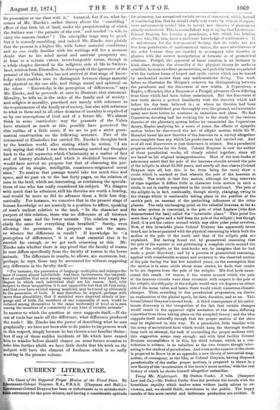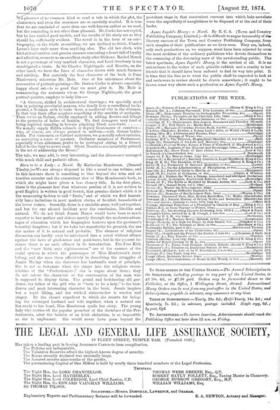Young Mr. Nightingale. By Dutton Cooke. 3 vols. (Sampson Low
and Co.)—Mr. Dutton Cooke does not produce his novels with the
breathless rapidity which makes some writers justly odious to re- viewers, and, we should think, unwelcome to the public. The happy results of this more careful and deliberate production are evident. It
1.1'a pleasure of no common kind to read a tale in which the plot, the characters, and even the sentences are so carefully studied. It is true that we are reminded of more than one well-known author as we read, but the reminding is not other than pleasant. Mr. Cooke has not copied, but he has studied good models, and tho results of his study are as they should be, sufficiently evident. The novel is in the form of an auto- biography, on the whole resembling, we are inclined to think, Charles Lever's later style more than anything else. The old law clerk, with his habitual caution and precise manner concealing a heart full of loyalty and affection, seems to us an excellent study after Dickens. Rachel Monck is not a personage of very marked character, and Lord Ovorbury is too Unmitigated a brute. In Sir Charles Nightingale and Rosetta, on the other hand, we have the lines of character drawn with much fineness and subtlety. But certainly the best character of the book is Fane Mauleverer, otherwise Mr. Mole. One of his utterances about the accessories of portrait-painting-31r. Dutton Cooke is always especially happy about art—is so good that we must give it. Mr. Mole is enumerating tho assistants whom Sir George Nightingale, the great portrait-painter, employs to help him :—
"A German, skilled in architectural drawings ; we specially need him in painting provincial mayors, who dearly love a castellated back- ground, a Norman arch to issue from, a niediwval city in the distance. In that way their office acquires something of the sanctity of antiquity. Then we've an Italian, chiefly employed in adding flowers and foliage to the portraits of ladies of fashion. We find dowagers very fond of being depicted standing in bowers plucking blush rose-buds We usually supply Militia colonels or deputy lieutenants of counties— who, of course, are always painted in uniform—with distant battle- fields. For statesmen or Cabinet ministers, we generally select curtains, as conveying a sense of mystery. Ordinary members of Parliament, especially when aldermen, prefer to be portrayed sitting in a library full of books they've never read. Silent Members are invariably painted in the act of addressing the House."
The tale, we may add, is very interesting-, and the denouement managed with much skill and pathetic effect.































 Previous page
Previous page